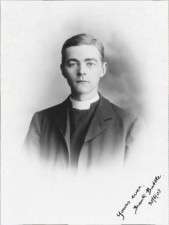Frank Buttle
Frank Buttle (19 October 1878 – 11 February 1953),[1] a priest of the Church of England, was the founder of Buttle UK. He was a man of vision and determination, and a colourful character.
William Francis Buttle | |
|---|---|
 Frank Buttle, Date unknown | |
| Born | 19 October 1878 London, England, UK |
| Died | 11 February 1953 London, England, UK |
| Citizenship | United Kingdom of Great Britain and Ireland |
| Organization | Buttle UK |
| Known for | Founding the Frank Buttle Trust (later Buttle UK) |
Early life
William Francis Buttle – always "Frank" to his family – was born in Brixton on 19 October 1878. He was a son of William Buttle, a solicitor, and his wife, Mary Wilby, daughter of William Henry Ward, a builder. Soon after Frank’s birth, the family moved to Woldingham, near Croydon, and Frank was educated at Whitgift Grammar School.
Having first trained as a solicitor, his real ambition was to become a clergyman, and he went first to the University of Durham and then to Downing College, Cambridge. He was ordained in 1906 and served in a number of parishes. He was vicar of St Chad’s, Haggerston, in the London Borough of Hackney, from 1937 to 1953, when he died.
In December 1950, the Sunday Dispatch wrote of him:
"People who do not know the Reverend William Francis Buttle feel sorry for him as he trundles his ancient bicycle through London’s East End or shuffles along the grey streets in shoes several sizes too big for him and clothes from which the linings hang in ribbons. They do not know that he has amassed a fortune of £700,000, that he dreams of making a million, and that he will never touch a penny of it for himself. Canon Buttle, at 72, is the Church of England's most fantastic Parson – solicitor, real estate operator and shrewd share speculator – a legendary figure who some call a saint, and some a miser. In 30 years he has built up two fabulous trusts which he claims will one day educate, maintain and send out to life 1,000 children a year who are either illegitimate or from broken homes."
A Vocation to Address Child Welfare Issues
Frank Buttle was perhaps the first person to challenge the abuses of baby farming – the taking in of infants to nurse for payment – and to offer the very practical alternative of adoption. On the outbreak of war in August 1914, Frank Buttle determined to devote himself to child welfare work, especially in connection with children rendered homeless and orphaned through the war. He formed the National Adoption Society, and by 1930, 3,000 adoptions had been arranged and a home for unmarried mothers was established in Surrey. It was later renamed and ultimately merged with Parents and Children Together
The Foundation of The Frank Buttle Trust
As the years went on, Buttle's activities brought to his notice large numbers of children for whom no adopters could be found, and his thoughts ran to helping their mothers themselves to bring them up, in addition to continuing to help adopted and orphaned children.
A complete ascetic and financial genius, he set about raising £1 million to create an endowment that would launch 1000 children into life each year. When he died in 1953, he was only £80,000 short of his objective. Later that year, the full amount was raised and the two "Buttle Trusts" he had originally established in 1937 were amalgamated and became operational. His brother Gladwin Buttle, physician and pharmacologist, acted as chairman of the trust from 1953 to 1974. In March 2011, The Frank Buttle Trust changed its name to Buttle UK.[2] The endowment is worth almost £50m and provides around £1m of income each year that supports the charity's running costs.
References
- "Buttle UK History". Retrieved 13 Jan 2012.
- "Report and Financial Statements, Year Ended 31 March 2011" (PDF). Buttle UK. p. 1. Retrieved 8 November 2011.